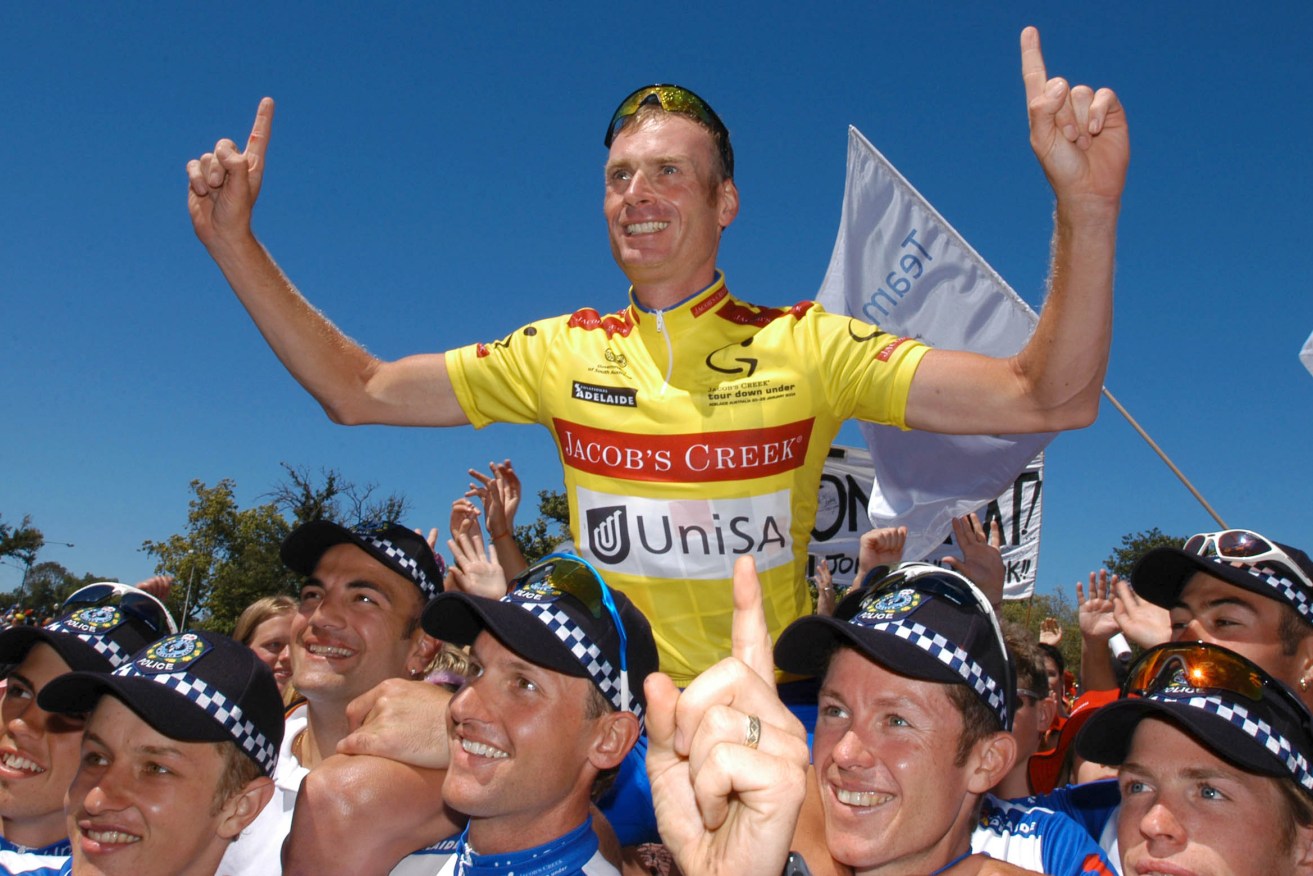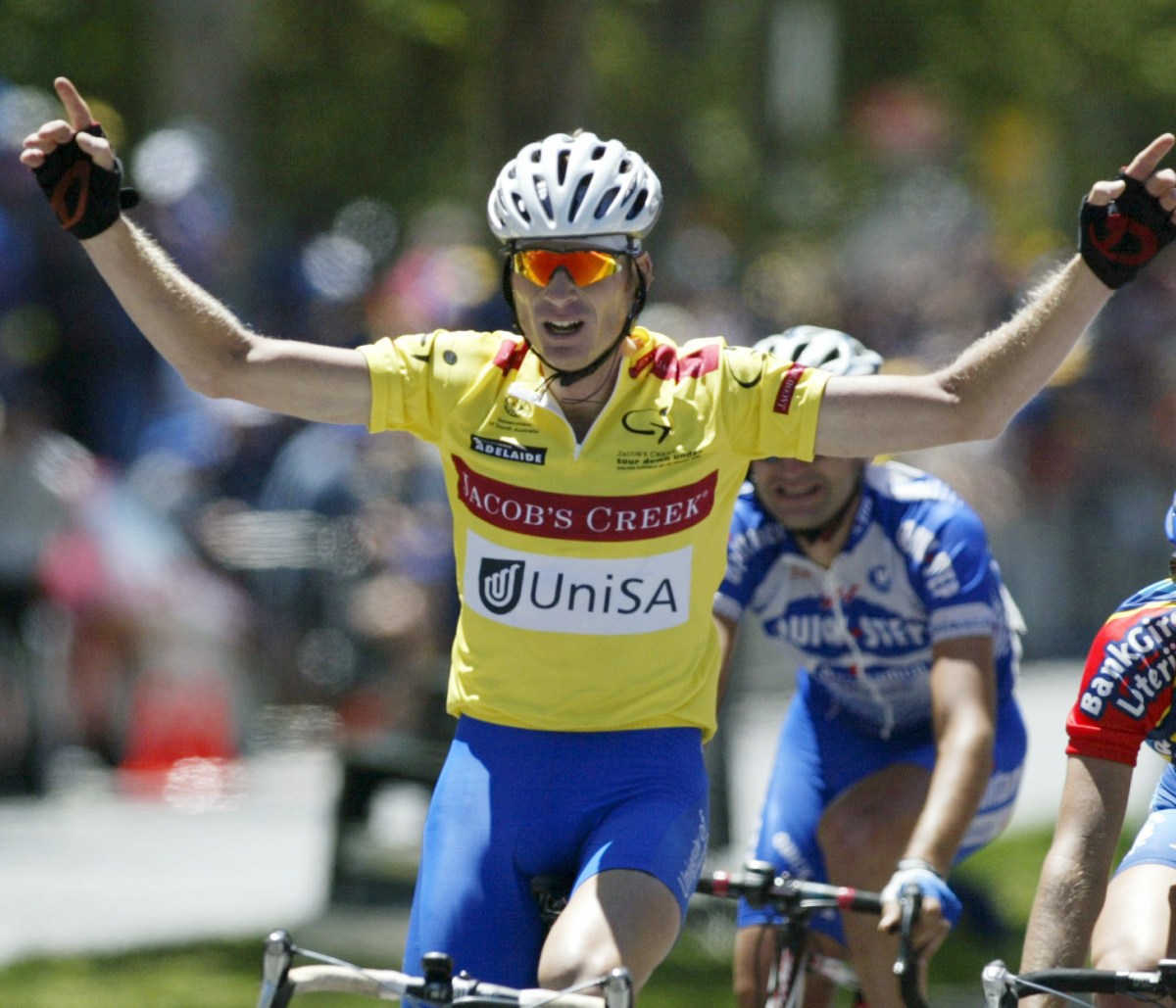Jonker: Injury saved me from becoming a drug cheat
Adelaide cycling great Patrick Jonker believes he missed out on going down in sporting history as “a great drug cheat” because of the injury that robbed him of the chance to race with the now-disgraced Tour de France winner Lance Armstrong.

Dutch-born South Australian Patrick Jonker and the UniSA Team celebrate their win at the 2004 Tour Down Under in Adelaide. Photo: Tom Miletic, AAP.
Jonker, who retired in 2004 after winning that year’s Tour Down Under, was a member of Armstrong’s US Postal Service team for one season in 2000. He was pre-selected to compete in the Tour de France that year, but was forced to withdraw with tendonitis – a devastating blow at the time that Jonker in hindsight believes saved his reputation.
“Had I ridden the Tour de France with [Armstrong] then I would be in a completely different situation than I am in today,” he said in a candid and revealing interview with Adelaide podcast Rooster Radio.
“I have no doubt that if you were in the US Postal Tour de France team then you had to then get onto the program of performance-enhancing drugs… I don’t think it’s possible to have ridden at the Tour de France with that team without being on the PEDs.”
Jonker has long insisted he had never had an inclination of the group’s widespread drug cheating, and he was not interviewed during the USADA investigation.
He said in a 2012 interview with NewsCorp Australia that “I can stand in front of a court with my hand on a Bible or whatever and say I saw no untoward activity”.
But his comments in the podcast suggest he believes the pressure to conform to the PED cheating regime would have been inescapable had he been part of that year’s race.
“It was the culture,” he said.
“You’ve got to think about it as not just one person, Lance Armstrong, taking drugs… at that particular time during the Tour de France, during that era it was almost, I wouldn’t say it’s the norm, but very close to being the norm.”
Jonker said when the tendonitis cost him his place alongside the world’s greatest cyclist, “my world collapsed”.
“I was in the Tour de France team and then missed out through injury a couple of weeks out,” he said.
“So I would have been in the team; they already had the Tour de France bike ready for me.”
Speculating on whether he would have fallen in with the PED culture, Jonker reflected: “It’s a question everyone could ask… at that particular time, I don’t think anybody would have flinched, and would have done whatever they were told to do.”
“It’s a hard call isn’t it?”
“Do you ask the question like, ‘You missed out on racing the Tour de France with Lance’, but you also missed out on becoming a great drug cheat.”
The man was obsessed; he was absolutely obsessed with winning and winning at all cost.
Jonker said he first met Armstrong when the future Tour Down Under celebrity drawcard was still a teenager “who had a remarkable physiology and was always better than most”.
“And then he went on to become one of the youngest-ever world champions as a professional at 21. And then obviously we know he had cancer and then he came back from his cancer and won the Tour de France an extraordinary seven times, which would never be repeated; and now we know why, obviously, because of the drugs.”
Jonker says Armstrong, who was stripped of all seven titles after his 2013 confession, was a man “obsessed”.
“He was absolutely obsessed with winning, and winning at all cost,” he said.
He believes the sport was set back decades after the Armstrong saga exploded.
“All the tour victories were tainted and pretty much taken away… I think it shattered everyone that enjoyed the sport because it was a huge part of everyone’s life, the Tour de France, for so many years,” he said.
But he believes cycling “has recovered remarkably” in the three years since.
“It’s extraordinary. We saw a few years ago when the Tour de France started in England – that had 1.4 million spectators in one stage. So the Tour de France has gone from being a drug-tainted sport, obviously due to what happened to Lance Armstrong at that period, and it’s rebounded.”
He says a more thorough testing regime has been part of that recovery.
Jonker also spoke candidly about how payments for cyclists have evolved, revealing the ad hoc arrangements and alliances needed to make a living in his younger years riding.
“In our team I was a sprinter, so I would do everything I could possibly do to make [the team leader’s] life as comfortable as possible from start to finish, and protect him and feed him, and push him if I had to, because I knew at the finish line, if you won this stage at the Tour de France, that he’d share his prize money with me,” he explained.
“So even though I didn’t earn a lot of money in my contract, the team leaders I rode with were very successful and they would then say, ‘Thank you for your help today, and here is some money in your bank account’… and that’s how you made a living.”
He said a successful team leader “could easily give you $10,000 as a thank you for the day’s work”.
“But it’s not often you win Tour de France stages,” he added.
“Back in the old days the contracts were not that big… In the Tour of Switzerland they would have a couple of hundred grams of gold, for example, and you’d be sprinting pretty hard for that gold, because a lot of the guys have families and wives and mortgages to pay off.
“It was a very cut-throat society of cycling where there’s not enough money to go around for everyone… so it’s kind of like a reflection of the real world, where sometimes you have to cut a deal with the opposition in order to get a result that benefits you both.
“Sometimes alliances are made out on the road… people that you don’t really like or you might even hate, but in order to get a particular result you’re going to have to form an alliance with the opposition in order to get a result to make some money. It is kind of a very interesting world.”
Jonker said he had to be fluent in languages such as French, Spanish, Italian and his native Dutch “in order to make an alliance with another team to talk about how much it will cost to get a particular job done during a race”.
“If I happen to be in a breakaway of eight or nine riders from different nationalities you kind of look at the fastest sprinter and you could say, ‘Look, I’m not going to win today, but you could win. Let’s say if I help you and you do win, you pay me’.
“So you have to be fluent; and also you have to trust these people, because you can make an alliance with somebody, you work for them and then they don’t pay you.”

Jonker crosses the finish line to win the 2004 tour in Adelaide. Photo: Tom Miletic, AAP.
He relived the gruelling ordeal of traversing the Tour de France in 1996 through the Alps in snow and rain.
“The only little bits of comfort you had were occasionally when a team car would give you some hot tea or chocolate, and when you weed your pants, because [that makes you] warm,” he said.
“If you are in extremely cold conditions you’re freezing, pretty much, your testicles are deep inside you, that’s how cold it is… when you’re freezing cold and you keep drinking tea because it makes you wee and that feeling of warmth is so satisfying.
“I remember one day it was so cold, we had to race through the tunnels and some of us huddled together in a tunnel for about five minutes because it was nice and warm in the tunnel, and then we went out of the tunnel and finished the stage.
“The other memories are in extreme hot conditions, where it’s so hot in the middle of France, looking at the middle of July during the heat wave, where the asphalt is melted and pieces of asphalt stick on your arms and legs, and at night time they need kerosene to get the asphalt off your legs and arms, and the clothing is thrown away because you can’t get asphalt off your clothing…
“Those days will stay with me forever.”




